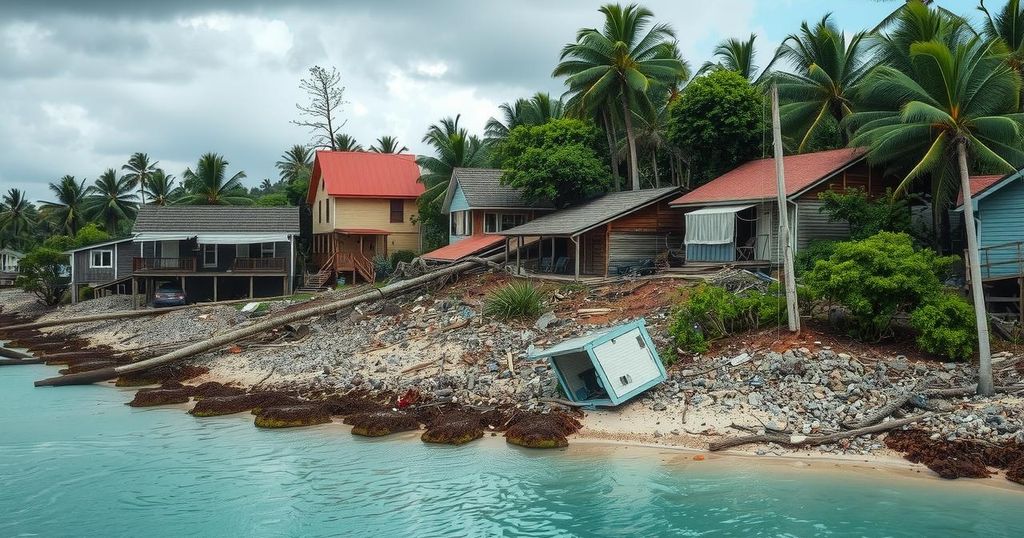Impact of Cyclone Chido on Mayotte: A Scene of Devastation

Cyclone Chido struck Mayotte on December 14, 2024, causing extensive damage to vegetation, agriculture, and infrastructure. Satellite images revealed drastic changes to the landscape, especially near Mamoudzou, while reports highlighted significant threats to food security and essential services. Recovery efforts are underway following the storm’s catastrophic impact.
On December 14, 2024, Cyclone Chido wreaked havoc on Mayotte, a French territory situated in the Indian Ocean. The cyclone, which was equivalent to a Category 4 hurricane, unleashed hurricane-force winds that tore roofs off homes, toppled utility poles, and uprooted trees. Satellite imagery from December 30, captured by the Operational Land Imager on Landsat 8, illustrates significant vegetation loss, particularly on the hillsides near Mamoudzou, Mayotte’s capital. The region’s lush landscapes transformed into desolate scenes of brown, showcasing the cyclone’s destructive impact.
Ecologist Jess Zimmerman from the University of Puerto Rico has conducted extensive research on the effects of hurricanes on vegetation in similar climates. He noted that the damage to forests was especially pronounced in the elevated areas where the winds were strongest. Cyclone Chido not only obliterated forestry but also caused considerable destruction to agricultural land, threatening the food supply of local communities. Reports indicated that essential crops, including banana trees, did not survive the storm’s fury.
Additionally, Cyclone Chido caused severe infrastructural damage, impacting critical facilities such as airports, hospitals, and roadways. The European Commission’s satellite assessments confirmed that the northeastern region of Grande Terre bore the brunt of the cyclone, where access to basic utilities like electricity, water, and communication services has been severely disrupted. The humanitarian situation in Mayotte continues to develop as recovery efforts commence after the cyclone’s devastation.
The cyclone season in the Indian Ocean can lead to severe weather events, particularly affecting island territories like Mayotte. Often, these storms result in significant damage not only to the environment but also to infrastructure and agriculture. Understanding the impact of cyclones like Chido on vegetation and the overall ecosystem is crucial for future preparedness and recovery efforts. Cyclone Chido is a stark reminder of the vulnerability of regions susceptible to tropical storms and their subsequent implications for local communities and economies.
In summary, Cyclone Chido has profoundly impacted Mayotte, showcasing the destructive capabilities of tropical cyclones. The storm’s aftermath includes significant vegetation damage, loss of agricultural crops, and severe infrastructural impairment, particularly in the northeastern region of the island. The ongoing recovery efforts will be vital to restore the local communities and infrastructure affected by this natural disaster.
Original Source: earthobservatory.nasa.gov








